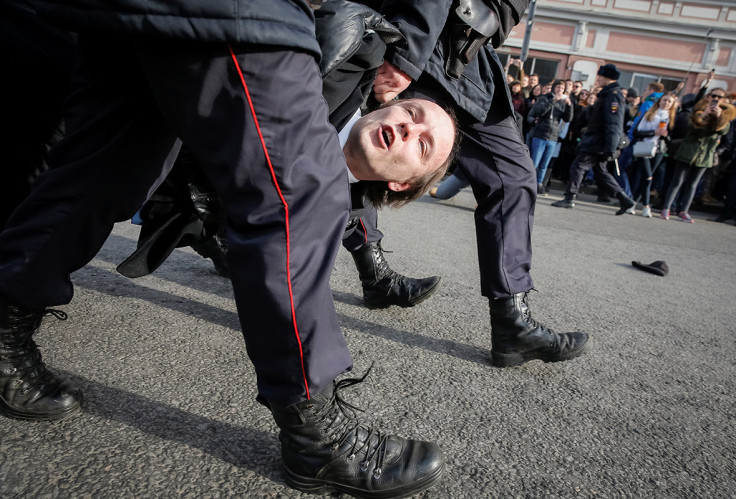Russia's protests were organised online - now the Kremlin will have social media in its sights
The demonstrations were the biggest in Russia since the 2011-12 protests against Vladimir Putin.

On 26 March 2017 anti-corruption protests were held in more than 80 cities across Russia; in two-thirds of locations protests were organised despite lack of authorisation from local authorities. In Moscow, at least 25,000 joined the protests, and in St Petersburg at least 20,000.
The protest in St Petersburg occurred on the Dvortsovaya Ploshchad (the Palace Square), outside the Winter Palace, reminiscent of the scenes of the Russian Revolution in 1917. In many of the regional cities protests attracted only 200-500 demonstrators, but in some regional centres, notably in Yekaterinburg and Novosibirsk, they were up to 5,000 strong.
Nevertheless, there were protests across the country – from Vladivostok on the Russian Pacific coast to Makhachkala, capital of Dagestan in North Caucasus. According to the reports by the credible Russian media, the total number of demonstrators nationwide reached up to 80,000 people.
The protests were peaceful but police and security services used force to disperse them in multiple cities. In Moscow alone at least 1,000 protesters were detained, including Alexei Navalny, the opposition leader who called for the protests against widespread corruption, including at the top levels of government.
In Makhachkala, the police reportedly detained about 150 protesters, and the local authorities denied that the protest had occurred in the city.
Later that day police raided the office of Navalny's non-governmental organisation, the Anti-Corruption Foundation, in Moscow arresting all the employees present, and seizing computers. The following day most of the Anti-Corruption Foundation employees were sentenced to between seven and 25 days of imprisonment. Navalny himself was sentenced to 15 days of jail and a $350 (£280) fine.
These large-scale protests followed the publication of a video by Navalny on 2 March, in which he alleged top-level corruption in the Russian government. In particular, Navalny alleged that Prime Minister Dmitry Medvedev reportedly used various charities to embezzle funds used for the purchase and construction of properties worth RUB70 billion ($1.2 billion, £960,000). Medvedev's office declined to comment on these allegations to the Russian or international media.
The YouTube video has been watched by more than 13.9 million viewers since. In previous anti-corruption investigations Navalny alleged ostentatious lifestyles and large-scale unexplained wealth of both senior government officials and of managers of state-owned Russian companies. The individuals named in these publications by Navalny either denied the allegations or declined to comment on the matter altogether.
The protests on 26 March were the most significant civil unrest in Russia since the 2011-12 protests against Vladimir Putin, who then moved from being prime minster to president. These protests were political in nature, and not economic ones, which were becoming increasingly common across Russia in the past several years. They also included a large number of young people, including those under 18. One of the faces of the protest in Tomsk was an 11-year old school boy who spoke against "politicisation of the school system and the school curriculum".
As these young Russians are likely to have little memory of the 2012 police crackdown against the previous wave of the protests, this may well enable additional mobilisation for future protests in the coming months. The revival of some economic protests, such as by long-haul lorry drivers protesting against increases in the road toll charges, has a potential to energise the civil unrest even further. Anti-corruption and anti-government protests will be likely in Russia even if Navalny and his associates remain in prison, and the operation of his NGO is temporarily disrupted. In defiance of the crackdown, the Navalny's Anti-Corruption Fund was flooded with fresh donations from sympathisers from across Russia.
However, the Russian government is likely to ignore the new protests, as indicated by the lack of coverage of the 26 March rallies in the Kremlin-controlled national media. Russia's Channel One chose to report about a 200-strong protest in Paris. The Russian anti-corruption protests are unlikely to lead to the resignation of Medvedev or the government, further reducing the efficiency of state governance in Russia. Medvedev and his ministers appear to have full support of President Putin, who will be unlikely to reshuffle his government ahead of the March 2018 election.
The Kremlin has long indicated it wanted a tighter control over the internet within Russia's sovereign boundaries
The election will be held on the fourth anniversary of Russia's annexation of Crimea – and the choice of this date will likely aim to mobilise Russian nationalist sentiment. Alexey Navalny, who in December 2016 announced his intention to run for president in the next election, is most likely to be blocked on procedural grounds. Thus, Putin, who is yet to announce his plans, will likely extend his rule over Russia for another six years, until March 2024. Putin came to power in Russia in early 2000, when he succeeded Russia's first post-Soviet president, Boris Yeltsin.
In the meantime the Kremlin is likely to use the anti-corruption protests as a pretext for additional restrictions against NGOs and the internet sector. NGOs will likely face new restrictions on fundraising and events organisation; IT and telecoms will likely face new regulatory requirements allowing for further government control of content creation and dissemination, especially ahead of the presidential election.
The Kremlin has long indicated it wanted a tighter control over the internet within Russia's sovereign boundaries and back in 2014 began working towards establishing "autonomous internet segment". The latter's completion is expected by the early 2018, in time for the election. Thus, if the Kremlin feels threatened by protests and growing dissent spreading over the social media, it will have an option of cutting off Facebook, Twitter or YouTube, which are increasingly used for coordination of the protests, altogether.
Alex Kokcharov is principal analyst of Europe & CIS country risk at IHS Markit.
© Copyright IBTimes 2025. All rights reserved.





















